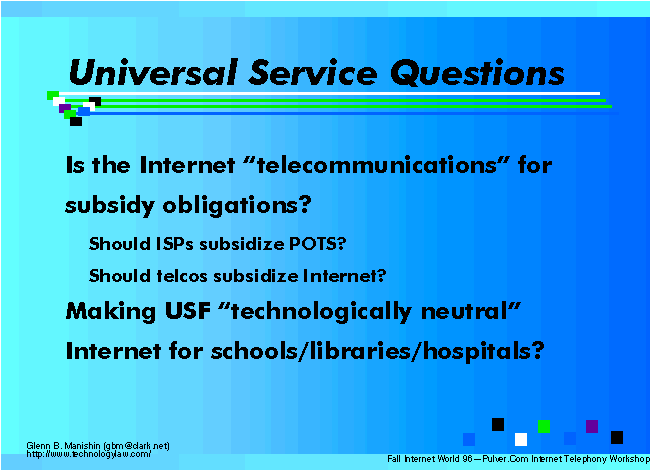
Universal service is a long-standing FCC and state regulatory policy, extended by Section 254 of the 1996 Act, that relies on a complicated system of implicit subsidies to support ubiquitous and affordable telephone service for socially favored consumers (e.g., rural and low-income subscribers). The Act requires major changes in universal service policy to make the system compatible with increased competition in the telecommunications industry. However, the larger policy questions of whether universal service is needed in the 1990s -- TVs and VCRs have higher penetration levels than telephone service without any governmental subsidy scheme -- and whether universal service policies traditionally applied for telecom services should be extended to the Internet, were obscured by political compromises fashioned in Congress.

The FCC's ongoing universal service proceeding raises significant questions about the application of universal service policies to the Internet and ISPs. Both LECs and IXCs are looking to reduce their universal service obligations and shift part or all of that "tax" burden to other players. At the same time, the FCC is struggling to implement a portion of the 1996 Act (Section 254(h)) that directs it to "enhance access . . . to advanced information services" for schools, libraries and hospitals. As a result, the Commission has been under intense pressure from the established telecom providers, as well as its internal embracement of the goal of "wiring" all American schools for Internet access, to classify the Internet as a "telecommunications service" in order to subject it to universal service obligations.
One of the biggest universal service issues facing the FCC is how to fashion a new universal service system that meets the Act's directives in a competitively and technologically neutral way. For instance, can ISPs be forced to contribute to the universal service fund ("USF") in order to maintain below-cost plain old telephone service ("POTS") rates, when (unlike long-distance and other telecom firms) they derive no benefit from POTS subsidies? On the other hand, should we require telecom carriers alone to fund universal service requirements used to subsidize Internet access for schools and libraries if subsidies will be paid to both telecom and Internet access providers? Because Congress left the ultimate scope of universal service largely up to the FCC, and gave the Commission the responsibility of periodically revisiting its universal service classifications, these type of questions can only increase in the years ahead.